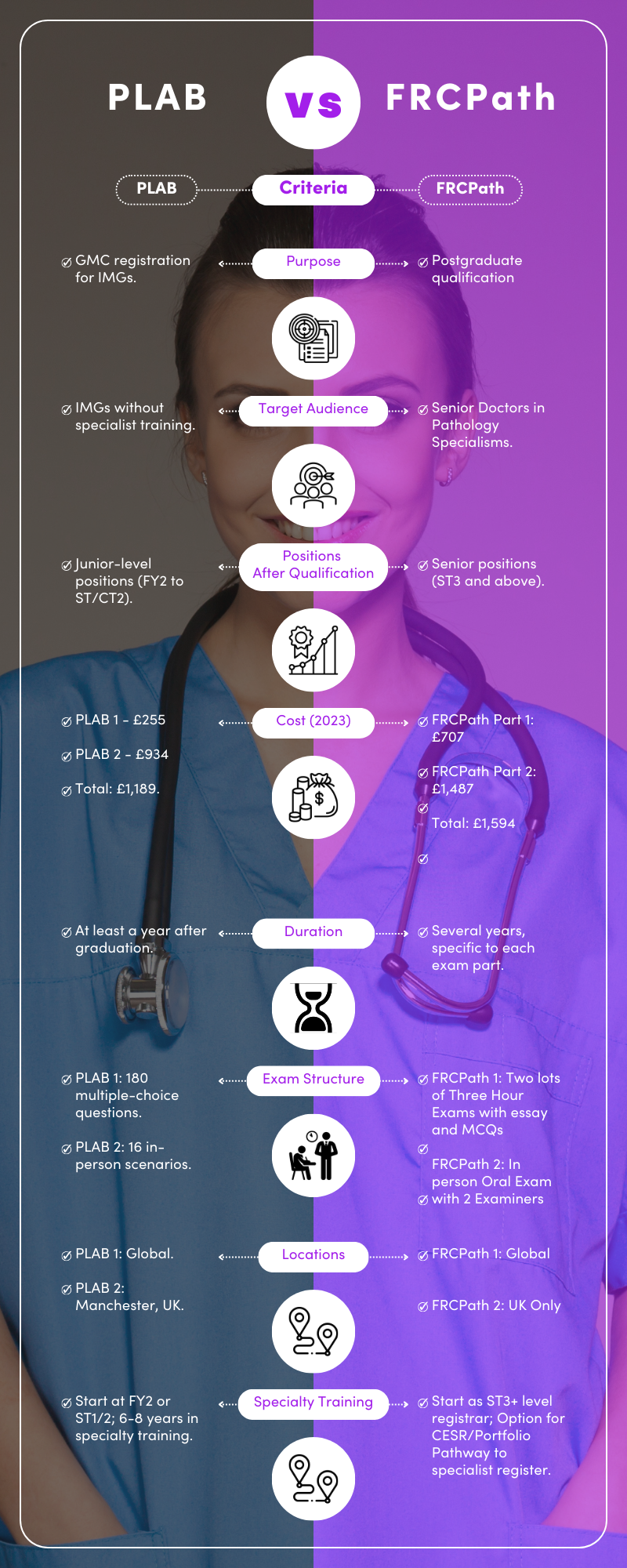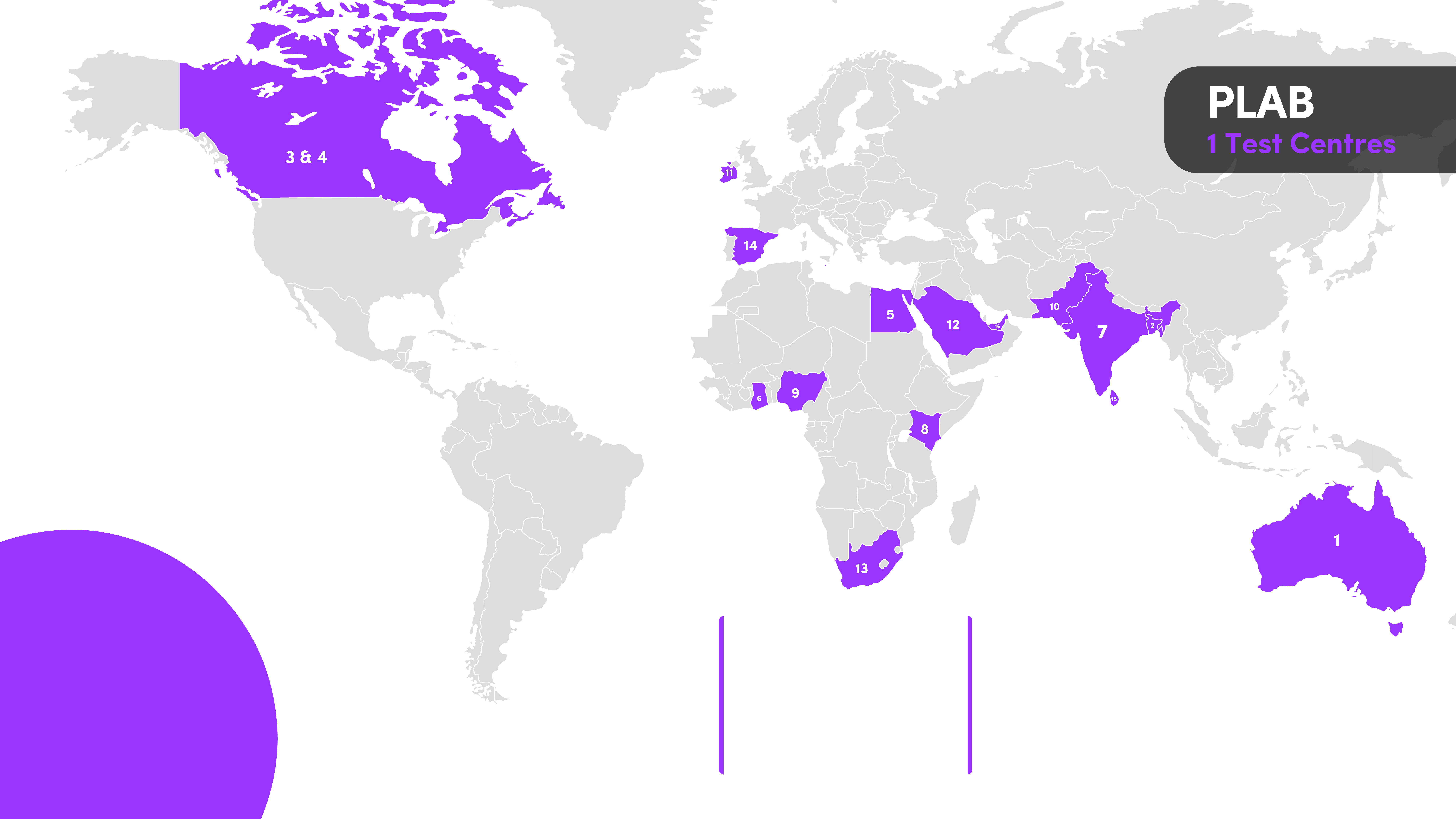
Should I sit PLAB or FRCPath for GMC?
14 Sept, 202314 Minutes
The process of getting GMC registered can often feel overwhelming to an international doctor. There are many boxes to tick and documents to check (and double-check). Not only do you need the right skills, knowledge, and experience to get on the GMC register, but you must also be able to prove that! One of the most common ways IMGs do this is by taking the PLAB test, a popular entryway into working as a UK doctor. However, that’s not your only option, as the GMC also accepts certain postgraduate qualifications instead of PLAB, including FRCPath which is aimed at more senior Pathology specialists.

Who are PLAB and FRCPath for?
Your route to the UK involves proving your current capabilities in the form of a qualification, and the GMC accepts both PLAB and FRCPath for this. Keep in mind, though, that they are very different – each qualification proves varying levels of knowledge and dictates the type of NHS roles you can apply for. That’s why it’s so important to know which one is right for you!
PLAB
The GMC created PLAB as a way to ensure all IMGs hold the same level of experience and expertise as UK doctors, thus ensuring patient safety. The exams test the knowledge and skills of an equivalent FY2 level doctor already in the UK. The test is a recognised qualification by the GMC, allowing IMGs to gain access to the UK to start their NHS careers. As such, PLAB is for international medical graduates who got their PMQ from somewhere outside of the UK, EEA, or Switzerland. There are also certain cases where PLAB might not be necessary.
If you have recently graduated (say, in the past couple of years) and you haven’t yet specialised in a specific branch of medicine, PLAB makes sense. However, if you have attained a postgraduate qualification or have gained specialised medical experience overseas, other options may appeal to you more than PLAB as they’ll allow access to more specialised roles.
FRCPath
FRCPath is a well-regarded postgraduate qualification awarded by The Royal College of Pathologists, and it demonstrates your ability to work independently as a pathologist. FRCPath has over twenty specialties in total, including the following:
- Clinical Biochemistry
- Dermatopathology
- Forensic Pathology
- Genetics
- Haematology
- Haematology Clinical Science
- Histocompatibility and Immunogenetics
- Histopathology
- Immunology
- Infection
- Medical Genetics
- Medical Microbiology
- Molecular Pathology
- Neuropathology
- Oral and Maxillofacial Pathology
- Paediatric Pathology
- Reproductive Science
- Toxicology
- Transfusion Science
- Veterinary Clinical Pathology
- Veterinary Pathology
- Virology
To take FRCPath part 1, you need one year of specialty training; for part 2, you’ll need even more specialty training years behind you. So, FRCPath is for IMGs who already have attained knowledge in one of these specialties – often a substantial amount of knowledge. If you have that, instead of taking PLAB, you can pass FRCPath, demonstrating your abilities and starting your NHS career at a higher level – usually ST3+, Specialty Doctor, Specialist or Consultant.
Keep in mind that FRCPath is also taken by UK doctors (unlike PLAB) towards the end of their specialty training in a pathology subspecialty, so it is geared towards the UK curriculum. In fact, IMGs can even take FRCPath after using PLAB to work in the UK and then working through the UK’s training system. So, even if you choose to do PLAB, you might end up doing FRCPath at some point down the line while training in the UK!
What Jobs Do PLAB and FRCPath Lead to?
While PLAB and FRCPath both grant you access to GMC registration (and, therefore, the ability to work in the UK as a doctor), they have a major difference in the types of NHS roles they lead to.
PLAB
Taking PLAB usually leads to junior and middle-grade jobs, so you can start at FY2 up to ST2. You will find these practitioner roles in hospitals throughout the UK, and you can apply to as many as you want. The difficulty involved in landing any of these roles depends on several factors, including how many other applicants there are, the type of role you’re applying for, and which level you apply for (such as FY2 or ST2). Generally roles at this level are much more competitive.
It’s important to note that it isn’t impossible to use PLAB for more high-level, senior positions. That said, it is common for Pathology department to require FRCPath before doctors can sign off their own reports. This makes PLAB a much more limiting option since it will be hard to secure the most senior positions.
FRCPath
Being a postgraduate qualification that demonstrates your expertise in one of the pathology subspecialties, FRCPath leads to higher NHS level positions compared to PLAB. The completion of this postgraduate qualification allows you to apply for jobs from ST3+ and above in the pathology subspecialty you chose. In fact, you can even become an NHS Consultant with FRCPath, assuming you use it to get CESR/Portfolio Pathway and join the specialist register.
Pathology specialisms in the NHS are often Consultant lead so having FRCPath allows you to join at that level since it proves your ability to sign off your own reports. It doesn’t guarantee a Consultant level post however it certainly helps if it is backed up with some excellent work experience.
How much do PLAB and FRCPath cost?
Naturally, you want to know how much these qualifications cost – especially when relocating to the UK is already going to be such a costly endeavour! As you will notice below, the PLAB examinations cost less than FRCPath.
PLAB Cost
- PLAB 1: £255
- PLAB 2: £934
Keep in mind that the PLAB examinations rise in cost each year, so you might have to pay a little more in the future.
FRCRPath Cost
You might be confused about the cost of FRCPath, especially as there are so many different subspecialties to choose from. Fortunately, The Royal College of Pathologists makes it quite simple, ensuring all exam candidates pay the same amount no matter which subspecialty they’re pursuing.
- FRCPath Part 1: £707
- FRCPath Part 2: £1,487
Much like PLAB, FRCPath examination costs tend to increase each year, so you may pay a different amount if you plan on taking them later than 2023/24. If you’re interested in learning where your money goes when paying for these examinations, The Royal College of Pathologists has broken it down here.
Completion Time of PLAB vs. FRCPath
PLAB
Taking PLAB requires a primary medical qualification and your IELTS or OET so you’ll need to think about how long they might take you to complete. From there, you can put in as much or as little preparation as you’d like. Of course, the more revision time you put in, the better chance you have to pass the exams first time. We recommend revising for a minimum of two months for each exam, placing more attention on the areas you aren’t so confident in.
You’ll also need to allow time to book PLAB2 which requires you to come to the UK in person. This might require a visit visa so factor that in. All in all it’s quite common for PLAB to take a year or longer to complete.
FRCPath
The completion of FRCPath in any of the specialties proves you can work in that specialty independently. As such, you can’t expect to be able to put in a few months of preparation training and be able to pass these exams! No – you’ll need to put in several years of work.
Part one asks you to have at least one year of specialty training, so make sure you have that. Then, you should put in between three to nine months of revision. For part two, you’ll need several years of training (the exact number depends on the subspeciality you’ve chosen). As a general rule, expect to need at least two years of specialty training and revision preparation to pass FRCPath Part Two. So, in total, preparation for FRCPath will take at least three years.
It’s clear that FRCPath preparation takes a lot more time than PLAB. It’s also clear that PLAB is cheaper, which many IMGs find appealing. However, don’t let those factors be the only reasons you choose PLAB over FRCPath – especially when you consider that FRCPath leads to a higher-paying senior role within the NHS. While it’s true that you can enter the NHS quicker with PLAB, you will be a more senior, specialised doctor if you do FRCPath, earning a higher salary.
Structure of the PLAB Exams
You can apply for PLAB part one as soon as you have your primary medical qualification (alongside IELTS and OET) and part two once you have received your passing results of part one. Keep in mind that you must sit part two within two years of passing part one. Here is the examination structure:
PLAB 1
PLAB part one is a written paper consisting of 180 multiple-choice questions, and you get a total of three hours to answer all the questions. The questions are phrased like a situation with a simple question and five potential answers to choose from.
PLAB 2
PLAB part two is quite different from part one in that it is a practical examination; instead of writing down answers, you will act out a clinical scenario in simulated clinical situations, with two examiners asking you questions and assessing you. This happens at 18 stations, and you get eight minutes at each (with two rest stations in the middle). PLAB part two only takes place in Manchester, so you’ll have to travel there to complete it.
Where to Sit PLAB Exams
Part One
UK Locations:
- Belfast
- Birmingham
- Cardiff
- Edinburgh
- London
- Manchester
- Newcastle
- Oxford
- Sheffield
Overseas Locations: 
- Sydney, Australia
- Dhaka, Bangladesh
- Toronto, Canada
- Alexandria, Egypt
- Cairo, Egypt
- Accra, Ghana
- Bangalore, India
- Chennai, India
- Hyderabad, India
- Kolkata, India
- Mumbai, India
- New Delhi, India
- Nairobi, Kenya
- Abuja, Nigeria
- Enugu, Nigeria
- Lagos, Nigeria
- Islamabad, Pakistan
- Karachi, Pakistan
- Dublin, Republic of Ireland
- Riyadh, Saudi Arabia
- Johannesburg, South Africa
- Madrid, Spain
- Colombo, Sri Lanka
- Dubai, UAE
Part Two
PLAB 2 only takes place in Manchester, UK. That means you’ll have to travel to the UK to take it, no matter where you are in the world.
Structure of the FRCPath Exams
The FRCPath examination content will naturally differ depending on which subspeciality you choose. You can’t expect the same questions from FRCPath: Haematology as FRCPath: Medical Genetics! If you want to understand the exam structure of each exam depending on your specialty, The Royal College of Pathologists has more information.
However, the good news is that we can show you the general structure of the exam. FRCPath exams typically come in two parts – one written exam (that you can take online) and a second oral exam.
FRCPath Part One:
FRPath Part One is a written examination that includes two three-hour papers – the first being an essay exam, with the second being a multiple-choice question paper. The content covers the entire curriculum of your specialty.
FRCPath Part Two:
FRCPath Part Two is an oral examination. This practical exam takes place in front of two examiners – one who will assess you and another who will ask you questions. Naturally, good communication skills are essential for passing this stage, as well as the ability to provide concise and accurate clinical judgments.
It’s important to note that some FRCPath examinations may differ slightly. If you want to know the specific structure of your FRCPath exam in a particular specialty, simply go to RCPath Examinations by Speciality.
Where to Sit FRCPath Exams
FRCPath Part One
You can sit FRCPath: Part One from anywhere in the world! That’s because, since 2021, The Royal College of Pathologists introduced the Test Reach online platform, allowing all candidates to take the test no matter which country they are currently in. The only criterion is that you have a stable internet connection.
FRCPath Part Two
You can take all FRCPath Part Two examinations in the UK. The international locations vary depending on your specialty, so check with The Royal College of Pathologists website to see where you can take it.
Speciality Training in the UK: What Are Your Options?
Most international medical graduates (and UK-based doctors) want to become a Consultant. It makes sense, considering Consultants have a lot of responsibility, earn a high salary, and are experts in their medical fields. The journey getting there can, of course, be lengthy. How lengthy depends on how much training you have and whether you choose to take PLAB or FRCPath.
After Taking PLAB
After taking PLAB, you can start working as a junior doctor for the NHS from level FY2. You won’t be able to go into specialty training immediately, but you can work towards it by doing FY2 and ST/CT 1-2. From there, you can pursue specialty training (ST3+), which leads to getting on the specialist register. Training lengths vary depending on which Pathology specialism you are pursuing but generally it’ll take 5 to 7 years.
After Taking FRCPath
With the postgraduate qualification FRCPath, you can automatically start specialty training in the UK at ST3+. This will be in your chosen pathology specialty, whether immunology, histopathology, or any other. You’ll gain the necessary training over the years, eventually leading to getting on the specialist register.
There is an alternative that lets you skip past the UK training system: CESR/Portfolio Pathway. You can use FRCPath for your CESR/Portfolio Pathway application, equivalent to CCT. With this, you gain access to the specialist register, allowing you to practice pathology independently in the UK. If you have a lot of experience in your pathology specialty and the documents to prove it, this may be a good option. Keep in mind that the CESR/Portfolio Pathway application is very strenuous – it requires lots of pages of evidence to prove your expertise. As such, it should only be pursued by IMGs who have a lot of experience in the specialty, ideally as a specialist or consultant in their own healthcare system.
Further Reading
Once you’ve decided which route is best for you then check out our comprehensive guides that will help you on your way to success:
How to get GMC Registration via PLAB
PLAB and FRCPath: Two Pathways to GMC Registration
There are a lot of ways that PLAB and FRCPath are different, but there is one huge way they are the same: they both grant access to GMC registration. No matter which one you complete, you will be able to apply for GMC registration and begin working as a doctor in the UK.
So, what else do you need for GMC registration? As well as passing either PLAB or FRCPath, here is what you’ll need before getting on the register:
Proof of ID
Usually, this will be your passport.
Primary Medical Qualification
This is the medical qualification you gained from college/university/medical school – you’ll need documents proving that you graduated.
Proof of Training/Internship
The GMC asks for a minimum of one year of training/an internship before granting GMC registration.
English Language Knowledge
You’ll need to pass IELTS or OET for this (assuming you didn’t get your PMQ in an English-speaking country).
Certificate of Good Standing
The GMC asks for a certificate of good standing from any medical regulatory authority you have worked at during the last five years.
Fitness to Practise
The GMC application will ask about your fitness to practise – you must answer these questions honestly.
You’ll need to collect all of these documents and use them when applying for GMC registration. You can send your application online, making it easy to do it from anywhere in the world.
If you’d like more information on GMC Registration then we have created a comprehensive guide for you – How to Get GMC Registration for International Medical Graduates
In Summary
PLAB is an assessment set by the GMC, and a pass in this allows you to get GMC registered and start UK work as a junior doctor. FRCPath is a lot more specialised – it’s a Royal College postgraduate qualification with over twenty pathology specialties to choose from. Upon completion of FRCPath, you can begin a UK career as a pathologist, either working as a specialist or even a Consultant.
Which you choose entirely depends on your career goals and experience. If you’re eager to begin an NHS career, but you have little training after graduation, PLAB makes a lot of sense. However, if you’re interested in a pathology specialty (or have already pursued one), then FRCPath may be the best option for you.
Both routes to GMC Registration will allow you excellent opportunities in the NHS and that’s where BDI Resourcing can help you. We’ve assisted more than 1,500 medical doctors relocate to the UK, joining more than 100 different NHS Trusts. If you’d like our support and guidance then please get in touch and we’ll be happy to help.


